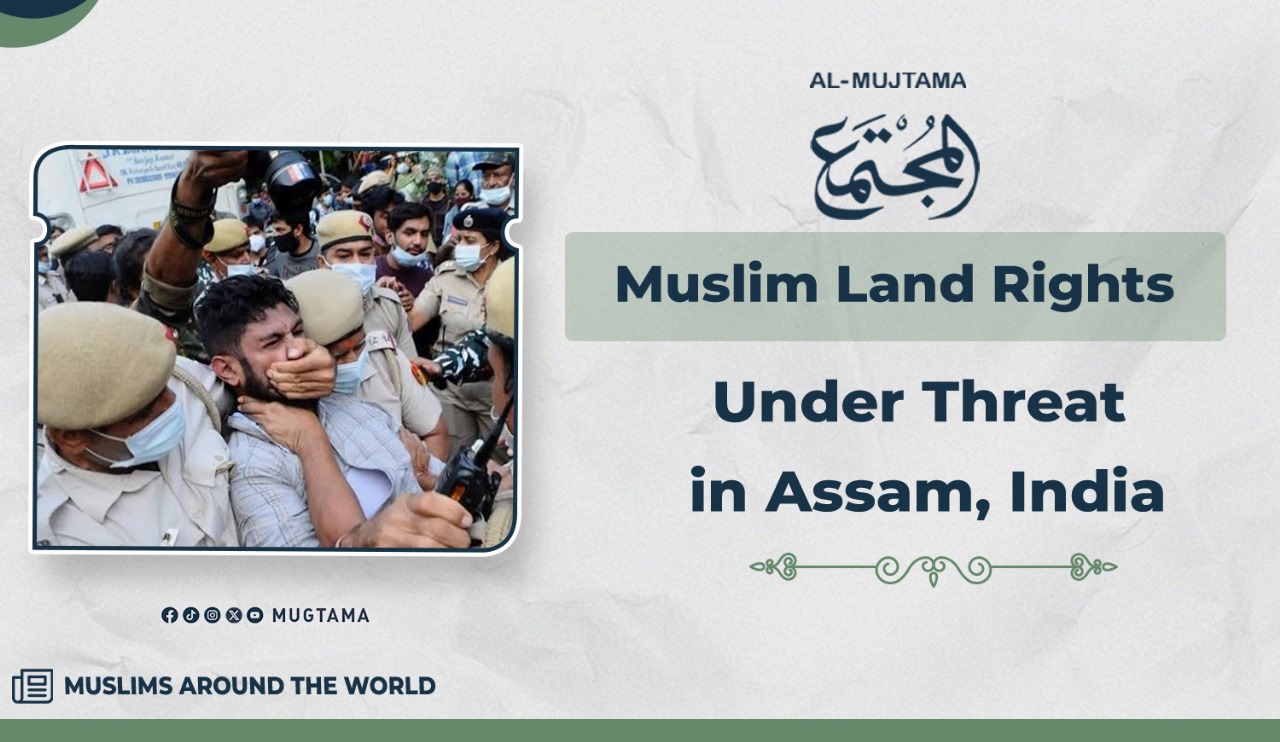Living as Strangers in Their Own Homeland
Muslim Land Rights Under Threat in Assam, India

Over the period from July 27 to August 4, 2025, India's Muslim minority faced a series of developments that have sparked widespread internal and external concern. These included a clear government escalation in forced eviction policies led by Indian Prime Minister Narendra Modi, particularly in the state of Assam, along with ongoing tensions resulting from the controversial new waqf (endowment) law.
This report aims to provide a detailed overview of the key
events and the social, political, and religious reactions of Muslims in India
to these developments.
1. The Major Eviction Campaign in Assam
In late July 2025, the Assam state government launched a land
eviction campaign in the Uriamghat area within the Rengma Reserve Forest.
Described as the "largest eviction operation in the state's recent
history," the campaign was based on claims that "illegal
residents" were encroaching on forest lands, a reference to Muslim
families of Bengali origin.
As a result, 278 structures, including homes, huts, and small
factories, were demolished. The government announced that it had reclaimed
about 3,000 bighas of land (approximately 990 acres or 400 hectares), with
plans to clear more than 11,000 bighas (around 3,630 acres or 1,470 hectares)
in subsequent phases. Estimates indicate that at least 2,500 families (roughly
12,000 individuals) have been affected.
Assam's Chief Minister, Himanta Biswa Sarma, asserted that the
campaign aimed to "reclaim state land" and that those affected were
"not legal citizens." He even called on some to return to Bangladesh
or Afghanistan, which drew widespread human rights condemnation.
2. The Amended Waqf Law
In April 2025, the Indian Parliament passed a law that
fundamentally alters the system of managing Islamic waqf properties in the
country. The most significant provisions include:
- Granting
the state the right to control waqf records and properties without
consulting local Islamic councils.
- Allowing
for the appointment of non-Muslims to waqf boards.
- Abolishing
the principle of "waqf by usage," which had previously
recognized historical waqf properties even without official documentation.
The law triggered a wave of rejection and objections from
India's Muslims, who see it as a step towards "dispossessing Islamic
institutions" and dismantling the waqf system, which is a crucial source
of support for education, healthcare, and religious services.
Reactions from India's Muslims to These Developments
First: On the Evictions in Assam
The affected areas saw large-scale protests, where:
- Residents
organized sit-ins and marches with the participation of religious
scholars, preachers, and local leaders.
- Organizations
like the Jamiat Ulema-e-Hind and the All India United Democratic Front
issued official statements condemning the evictions and demanding a
judicial investigation.
- Activists
launched a social media campaign with the hashtag #StopEvictionsInAssam,
which received extensive local and international engagement.
- Muslim
parliamentarians announced their intention to file a legal challenge in
the Supreme Court, demanding a halt to the demolitions and accountability
for officials.
Second: On the Waqf Law
Reactions were more organized and comprehensive across India,
with key actions including:
- Demonstrations
in major cities such as Hyderabad, Delhi, and Lucknow, demanding the law
be repealed.
- A
unified Friday sermon on August 2nd, titled "Defending Waqf is
Protecting Identity," was delivered by prominent imams.
- The All
India Muslim Personal Law Board launched a national petition that
collected over 500,000 signatures in a few days and submitted it to the
Supreme Court to challenge the law.
- Political leaders from the All India Majlis-e-Ittehadul Muslimeen and the Samajwadi Party (a secular party known for its defense of minorities, including Muslims) issued statements asserting that the law targets Muslims and undermines their religious and financial independence.
Among the voices that rejected these events were Ahmad al-Haq,
one of the victims of the Assam evictions, who said: "Every day we wake up
not knowing if our house is still ours... We live as strangers in our own
homeland."
Also, Maulana Khalid Rasheed, a member of the Central Waqf
Council, stated: "Waqf is our schools, our hospitals, and our mosques...
To seize them is to confiscate our future."
Additionally, Fatima Ansari, an activist in Delhi, said:
"We do not reject reform, but we reject exclusion and
marginalization."
During this short period, it became clear that India's Muslims are facing cumulative challenges related to constitutional rights and community identity, whether through eviction policies or new legislation like the waqf law. These developments threaten to escalate sectarian tension and erode trust between the government and the Muslim community, requiring urgent legal, political, and human rights action. The popular and organized response of Muslims during this period reflects a growing awareness within the minority community and a clear rejection of the marginalization and exclusion they have faced for many years.











